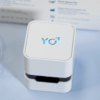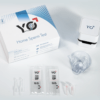The use of donor sperm is increasing in the USA. Traditionally, there has been a shroud of secrecy around its use when trying to conceive, but nowadays couples and single women who undergo donor insemination may find there is far greater understanding and acceptance.
There are various reasons you might be considering using a sperm donor. Before you proceed, it is important to be sure that using donor sperm will be right for you.
Why Use Donor Sperm?
Between 2015 and 2017, over 440,000 women used donor sperm compared to around 170,000 in 1995. This may be due to rising male sub-fertility and infertility, advances in the success and availability of fertility treatment such as IVF, and more single women and same sex couples undergoing fertility treatment.
The reason for using donor sperm may depend on your sexuality, relationship status, health, or family history.
Heterosexual couples
A straight couple may approach a fertility clinic if they have not conceived despite regular sexual intercourse for six months or longer. The clinic will investigate both partners to try to determine a cause for infertility. If semen analysis shows that there is a significant male factor, such as a low sperm count or reduced sperm mobility, donor sperm may offer a positive solution.
However, it is important to remember that in many cases of male factor subfertility, treatment cycles including IVF or ICSI may allow you to conceive using your own sperm.
Donor sperm is only likely to be needed in cases where there is little or no sperm production, or where the sperm being produced would not be able to fertilize an egg. This may include men who are infertile following treatment for cancer.
In some cases, a man may be aware of a serious inherited disease in his family. To avoid passing this to his child, he and his partner may instead choose to use donor sperm.
Lesbian couples
Two women may wish to try to conceive using donor sperm. After discussion with a fertility clinic, options for treatment may include intrauterine insemination (IUI), in vitro fertilization (IVF) and reciprocal IVF. Your choice of treatment may depend on personal choice, medical recommendation, and any financial implications.
Alternatively, in some countries couples can choose to use a private sperm donor to conceive at home through artificial insemination. Before using a private donor, be sure to check the implications regarding parental responsibility for any children conceived.
Single Women
Having a child as a single woman is no longer taboo. Using donor sperm allows an individual to create a family without a partner. Being a single mother by choice is becoming more popular, and many women enjoy the freedom that solo parenting offers.
Finding a sperm donor privately is also possible, but be sure to check where you and the donor would stand legally regarding any children conceived.
YO Sperm Test
Wherever you are in your fertility journey, it can be empowering to learn more about your sperm in the privacy of your own home. Performing a YO Test is simple, and you’ll receive test results straight to your smartphone. As a semen analysis screening test, YO reports your motile sperm count, and how this compares to other men who have fathered children.
Women using a private donor to conceive may also find it reassuring to get YO results prior to embarking on insemination.
Final Thoughts
Using donor sperm is far more common than it used to be, and there are many reasons why it might be the next step for you.
Using donor sperm by private arrangement, or through a fertility clinic, has helped many couples and single women create the family they have been dreaming of. Speak to your fertility clinic to find out more about donor sperm.
To learn more about your motile sperm count, or that of your donor, order a YO Test today.







